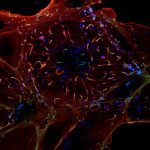Positions are available immediately for 3 postdocs of 18 months to work on methodological and probes development based on fluorescence and luminescence imaging. The projects aim at developing and characterising new optical methodologies based on recent work form the laboratory using luminescence-based excitation of nanoparticles and to develop and validate new applications for new nanoparticles in collaboration with an industrial partner. Those projects cross disciplines ranging from optical physics to fluorescence, luminescence and bioluminescence in vitro and in vivo imaging, biochemistry, cell biology. Imaging technologies that will be used include super-resolution and correlative fluorescence microscopy, bioluminescence microscopy and fluorescence and bioluminescence in vivo imaging.
We are seeking for motivated candidates with experience optical microscopy and imaging and in one of the following fields :
- optical physics and microscopy
- animal models of diseases (tumors or infection) and optical in vivo imaging
- biochemistry, bacteriology and cell biology.
Scientists in physical sciences wishing to learn about biology are especially encouraged to apply.
Candidates should be able to work in a multidisciplinary environment with capacity to reach timely focused research objectives.
These positions are available within the Imagopole, part of the Center for Innovation & Technological Research (Citech) of the Institut Pasteur. Applications including CVs, motivation statement and 2 recommendation letters (to be sent separately) should be addressed by email to both Spencer Shorte (spencer.shorte@pasteur.fr) and Régis Tournebize (regis.tournebize@pasteur.fr).
Salary: Depending on education and experience.
Location: Imagopole, Institut Pasteur, 28 rue du Docteur Roux, 75724 Paris Cedex 15, France.
Person specification:
- Research experience and (strong interest in optical imaging.
- Excellent verbal and written communication skills. The working language of the laboratory is English.
- Experience in communicating research findings to a non-specialist audience and in a multicultural environment.
- Ability to work independently and in collaboration with a larger interdisciplinary research team.
- PhD in one of the following areas: optical physics, bacteriology, animal models of diseases, in vivo optical imaging, microscopy, biochemistry

